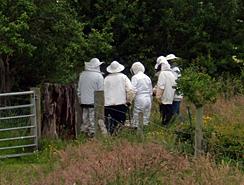The Honey Bee Colony
Beekeeping is a diverse activity centered on the Honey Bee Apis mellifera. In summer there may be over 60,000 Honey Bees in a strong colony. One of them is a Queen, capable of laying over 1000 eggs per day. There are several hundred Drones, male bees whose function is to mate with the young Queens, and the remaining majority are female Worker bees.
 The Workers' activities change during their adult life. At first they stay in the hive, cleaning, tending and feeding larvae, constructing the wax comb cells and processing nectar. After serving as guards at the hive entrance, they forage for nectar, pollen, propolis and also for water.
The Workers' activities change during their adult life. At first they stay in the hive, cleaning, tending and feeding larvae, constructing the wax comb cells and processing nectar. After serving as guards at the hive entrance, they forage for nectar, pollen, propolis and also for water.
Honey Bees turn nectar into honey, store and use pollen to feed their larvae and employ a mixture of natural resins (Propolis) to strengthen and waterproof the hive. The Honey Bee colony behaves as a single unit and, although the modern hive permits the beekeeper to perform many manipulations, the colony is not 'domesticated' in the way that farm animals are. The successful beekeeper will therefore learn to work with his/her bees, to handle them with gentle firmness but without fear. He/she also learns to observe, interpret, quickly assess and be alert to the needs of the colony.
You must have had some interest in bees and honey before looking at these pages, and you have probably got some knowledge that may have been gleaned from a variety of sources but beware as much information has been media generated and may not be correct.
All you need to keep bees is to be reasonably fit, have somewhere to keep them, and be able to understand the basics which will help you understand much of what happens inside a colony.
The North Shropshire Beekeepers' Association (NSBKA) have regular demonstrations with bees during the active season, and follow up with lectures during the inactive season. Take every opportunity you can to handle bees and watch others closely, as you can often see why some are better handlers of bees than others by the way the bees behave. This is where you should get a good grounding and your own handling and colony management techniques will be developed.
Is Beekeeping for Me?
There are surprisingly few restrictions to keeping bees. The beekeeper should be reasonably fit as there can be some heavy lifting to do, but this can be shared as there should be no shortage of offers of help. Most beekeepers' associations have beginners who are willing to help others in return for learning. Obviously if someone is allergic to bee stings it would be a mistake to take up, or continue with beekeeping. (There are desensitizing treatment courses run by allergy specialists for honey bee stings, but these are held in regional centres and are long and drawn out. They have about an 80% success rate - Your family doctor can refer you.) On the subject of stings it must be expected to get several in a season and a beginner is likely to get a few more than an experienced person. Most stings are caused by poor handling and/or poor bees, both of which can be overcome, but accidental stings are common as well and a part of beekeeping. Some people are genuinely frightened of bees and unless this fear can be overcome it would be pointless to continue.
Many gardens will accommodate a couple of hives providing they are sited sensibly, but dont risk problems with your family or neighbours. Some people have a fear of insects and may not share your enthusiasm, so please be responsible. Education can help to overcome any fears, but if this doesnt work, a careful search of your own area could provide you with a suitable site on a farm, or similar place where there is often a small area of waste ground. Many people in towns and cities keep bees, often unknown to their neighbours and they often do well because of the flowers in parks and gardens.
Before investing in equipment you will have to dispose of if you decide beekeeping is not for you, it would be a good idea to visit several practical bee demonstrations and take every opportunity to handle bees.
Time and Commitment
Beekeeping is seasonal and the amount of time needed varies. During the summer expect to spend, say, an hour on one colony, and 20-30 minutes on subsequent colonies per week for an inexperienced beekeeper, and half that for those who have been keeping bees for a year or so. A reasonably experienced beekeeper will only make fortnightly inspections, which further reduces the time needed. Swarming is the main problem during the summer and there are times when colonies must be inspected, and it is no good putting inspections off until tomorrow, otherwise your swarm could be causing a nuisance to someone else and possibly sour relations, as well as causing a possible loss of honey.
Winter work is generally maintenance of equipment which takes up little time.
| Joining the NSBKA | Beekeeping Taster Course |

